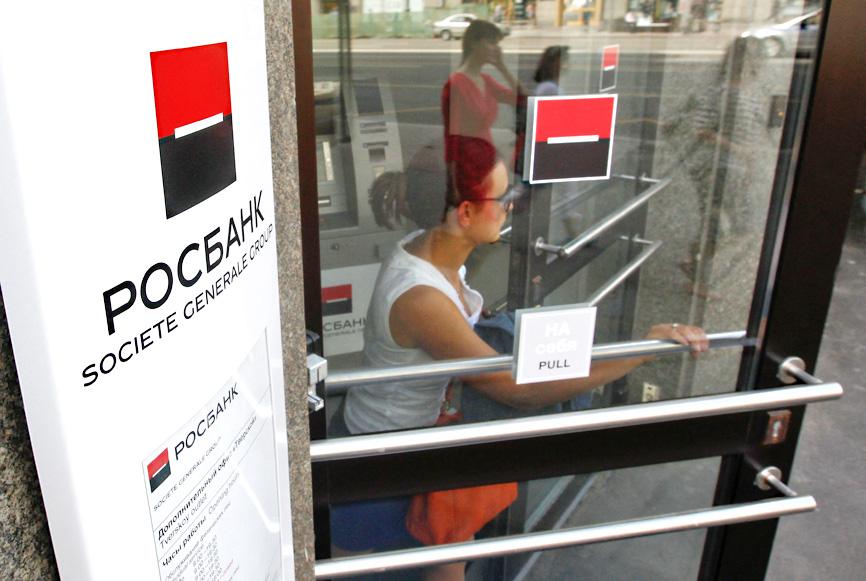Societe Generale SA would take a hit of about 3 billion euros (US$3.27 billion) after agreeing to sell its Rosbank PJSC unit to the investment firm of Russia’s richest man.
The Paris-based bank signed an accord to sell its entire stake in Rosbank and its Russian insurance subsidiaries to Vladimir Potanin’s Interros Capital, it said in a statement yesterday.
Despite the financial hit, Societe Generale said that it would continue with a planned stock buyback of 915 million euros and a dividend for last year of 1.65 euros per share.

Photo: Reuters
Societe Generale’s Russian business generated 2.7 percent of last year’s profit and accounts for 1.7 percent of the bank’s total exposure. Local activities are mainly exposed to retail and large corporate clients.
The bank’s decision to exit Russia is the most decisive yet among the largest European banks with operations in the nation. Raiffeisen Bank International AG and UniCredit SpA are mulling their futures in the country. The three banks are the biggest on the continent with Russian firms.
Societe Generale yesterday rose as much as 8.2 percent in Paris trading as the divestment removed uncertainty over the impact of the bank’s Russia business.
The sale is expected to close in the coming weeks, subject to approval by regulators and antitrust authorities, the bank said.
Potanin, 61, is the world’s 43rd richest person with a net worth of US$29.6 billion, according to the Bloomberg Billionaires Index. He is president of MMC Norilsk Nickel PJSC, which accounts for about 40 percent of global palladium output and 10 percent of refined nickel, and has a stake in Russian company Petrovax Pharm.
Societe Generale would have a 2 billion euro write-off on the net book value of the divested activities and an exceptional non-cash item of 1.1 billion euros related to the reversal of the conversion reserve in the group’s income statement.
The disposal would have an impact of about 20 basis points on the bank’s CET1 ratio, it said.
Societe Generale’s French peers BNP Paribas SA and Credit Agricole SA had announced that they would no longer take new business in Russia, joining a growing group of lenders that are pulling back from Russia amid wide-ranging sanctions imposed against the country.
In the past weeks, Goldman Sachs Group Inc, JPMorgan Chase & Co, Deutsche Bank AG and Commerzbank AG have all taken steps to cut business in Russia.

SETBACK: Apple’s India iPhone push has been disrupted after Foxconn recalled hundreds of Chinese engineers, amid Beijing’s attempts to curb tech transfers Apple Inc assembly partner Hon Hai Precision Industry Co (鴻海精密), also known internationally as Foxconn Technology Group (富士康科技集團), has recalled about 300 Chinese engineers from a factory in India, the latest setback for the iPhone maker’s push to rapidly expand in the country. The extraction of Chinese workers from the factory of Yuzhan Technology (India) Private Ltd, a Hon Hai component unit, in southern Tamil Nadu state, is the second such move in a few months. The company has started flying in Taiwanese engineers to replace staff leaving, people familiar with the matter said, asking not to be named, as the

The prices of gasoline and diesel at domestic fuel stations are to rise NT$0.1 and NT$0.4 per liter this week respectively, after international crude oil prices rose last week, CPC Corp, Taiwan (台灣中油) and Formosa Petrochemical Corp (台塑石化) announced yesterday. Effective today, gasoline prices at CPC and Formosa stations are to rise to NT$27.3, NT$28.8 and NT$30.8 per liter for 92, 95 and 98-octane unleaded gasoline respectively, the companies said in separate statements. The price of premium diesel is to rise to NT$26.2 per liter at CPC stations and NT$26 at Formosa pumps, they said. The announcements came after international crude oil prices

DOLLAR SIGNS: The central bank rejected claims that the NT dollar had appreciated 10 percentage points more than the yen or the won against the greenback The New Taiwan dollar yesterday fell for a sixth day to its weakest level in three months, driven by equity-related outflows and reactions to an economics official’s exchange rate remarks. The NT dollar slid NT$0.197, or 0.65 percent, to close at NT$30.505 per US dollar, central bank data showed. The local currency has depreciated 1.97 percent so far this month, ranking as the weakest performer among Asian currencies. Dealers attributed the retreat to foreign investors wiring capital gains and dividends abroad after taking profit in local shares. They also pointed to reports that Washington might consider taking equity stakes in chipmakers, including Taiwan Semiconductor

A German company is putting used electric vehicle batteries to new use by stacking them into fridge-size units that homes and businesses can use to store their excess solar and wind energy. This week, the company Voltfang — which means “catching volts” — opened its first industrial site in Aachen, Germany, near the Belgian and Dutch borders. With about 100 staff, Voltfang says it is the biggest facility of its kind in Europe in the budding sector of refurbishing lithium-ion batteries. Its CEO David Oudsandji hopes it would help Europe’s biggest economy ween itself off fossil fuels and increasingly rely on climate-friendly renewables. While